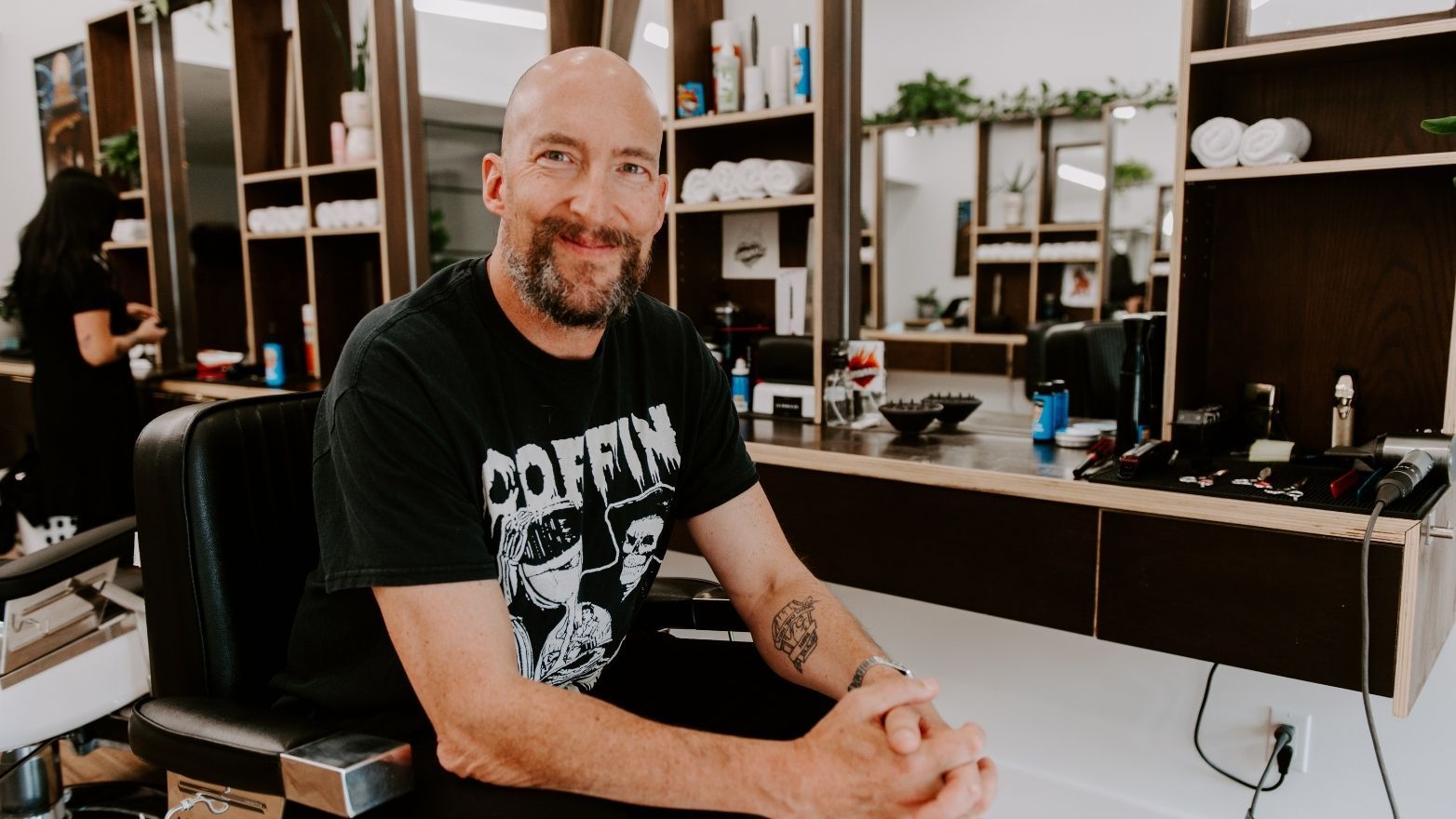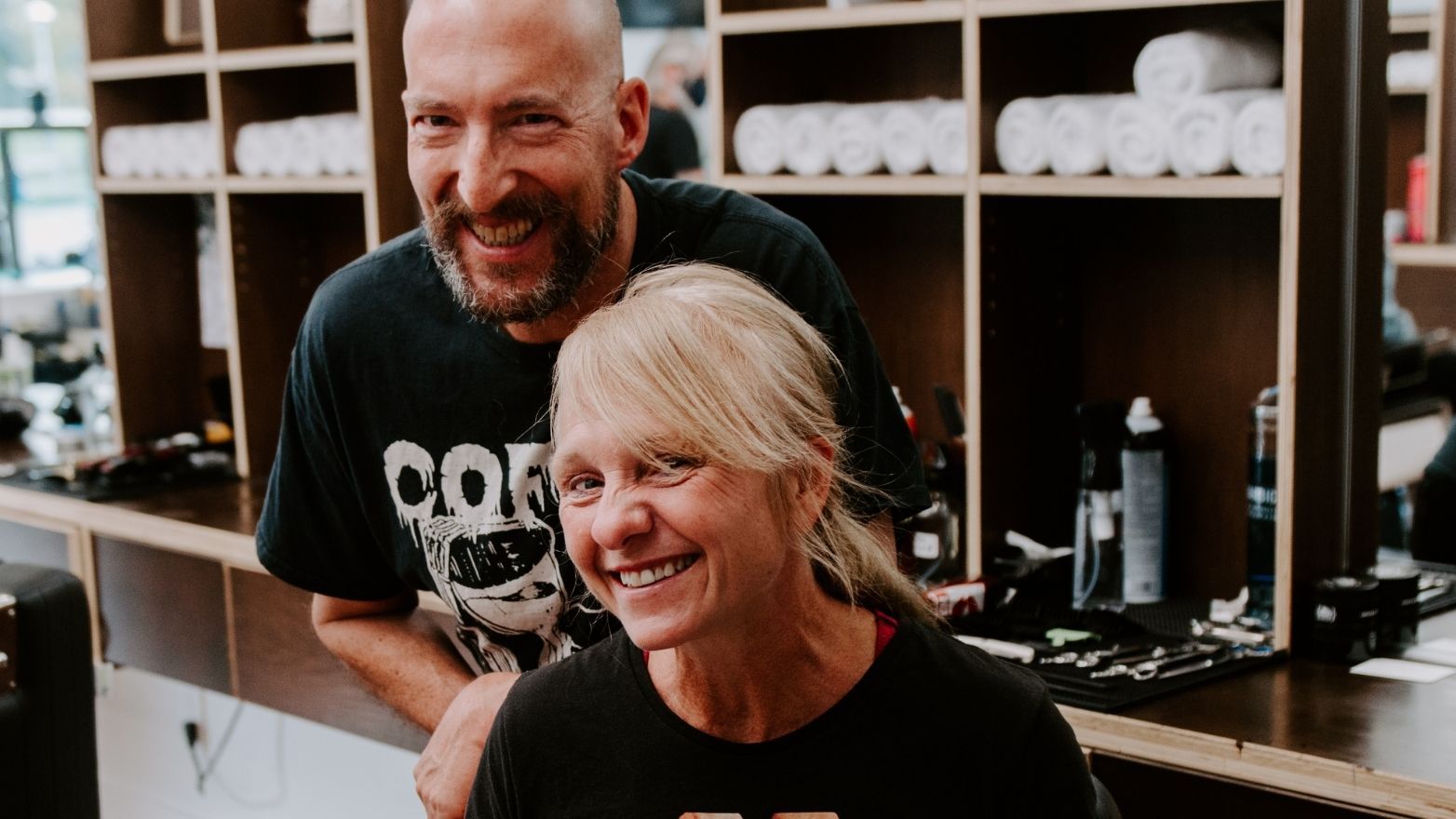


Tanja And Matt On Their Son’s Six Year Testicular Cancer Journey
Tanja Zientara and Matthew Greeson lost their son, Nicholas Greeson, in 2018 after a six year battle with testicular cancer. Now, they run an annual charity concert – Great Balls of Fire – to commemorate their son and raise awareness for testicular cancer.
Tanja and Matt sat down with us recently in the barber chair to discuss their involvement with Movember, Nicholas’ journey through testicular cancer, how music played an integral role in their lives and more.
What’s your motivation for doing Movember?
We know that Movember supports men’s health issues that deal with both the mental and physical well-being of men of all ages, issues that are often ignored by society. I love the combination of humour and seriousness that this organization uses to approach these issues. Their approach to difficult topics makes Movember incredibly relatable and is very effective in educating people on complex issues. As a mother of two boys, I totally respect Movember’s efforts to support men in leading healthy lives. I also love the fact that Movember is supporting research to help find cures or alternative treatments for diseases which impact both young and older men. I am especially impressed by their efforts to educate young men about testicular cancer.
What resources and supports helped you during the process of Nicholas going through TC, as well as afterwards?
We were so blessed with so many resources and supports to help us with Nick. The founder of Testicular Cancer Canada lost her son to testicular cancer and she was incredibly supportive during Nick’s entire journey. I would call this woman on a regular basis and she spent inordinate amounts of time helping me. Make A Wish was also fantastic. They were able to give Nick and our whole family a wonderful trip to the Dominican Republic. They presented Nick with this trip during one of Nick’s house shows in which there were about 200 kids in attendance. The wish granters were fantastic; they bought pizza for all the kids in attendance and they even joined the mosh pit in our basement.
We also had the support of Child-Can. When Nick was first diagnosed, they provided us with a parking pass for the hospital, lasting a total of six years.You can imagine how much money we saved!
I also had huge support from my school board. They connected me with groups that provided me with social, emotional, physical supports. As well, we were granted time off when Nick was in treatment, and unlike many parents we crossed paths with, job security was never an issue. We were also connected with specialists in the field of testicular cancer who were able to read Nick’s case and help us understand the course of his treatment. We had unbelievable supports from our colleagues at work as well as family and friends who brought us food, gave us gift cards, etc., all of which sustained us through the six years in which Nick was in treatment. I would also like to give a huge shout-out to the London Health Sciences Centre. All of Nick’s nurses and doctors were beyond outstanding.
As a musician, what were some of your fondest memories of Nicholas’s music and is there a standout song or performance of his that stands out?
Music got us all through Nick’s treatment. Many families spend their lives in hockey arenas, but we spent ours driving our kids to music lessons. Music has been a huge part of our lives. I don’t know what we would have done without Nick’s connection to the local music scene. By the time he reached 17 years old, he was a seasoned veteran of many different hardcore/punk bands in London and he’d developed into a natural songwriter. Often, I (Matt) would listen in on Nick’s rehearsals and ask, “Nick, is that a Bring Me The Horizon cover?”, to which he’d reply, “Naw, that’s one of my tunes!” Damn! There were so many strong songs and stand-out performances; however, Nick’s song, Me, You and Labatt Blue, which he wrote with his band Over Flowers, has become his signature song. The consensus is that it should be used to sell the beer. Since Nick’s passing, we play it at all his birthdays, and other special events. We even recorded a crowd singing the chorus en masse, something I would like to repeat every year.
Apart from that, I will never forget that Nick would tour with his bands all through his cancer treatment. Nothing would stop him. Even if he was in the middle of brutal chemo treatments, he would still go on stage with a bucket at his side. Post-surgery, Nick would often play with a drainage port hanging off his chest or neck, a weird guitar accessory. I will never forget any of Nick’s house shows. No matter how sick he was, he would organize these epic shows at our house, packing about 10 bands and 100 kids into our tiny basement mosh pit. I would often hear Nick singing from his room on his acoustic guitar. He loved all music, be it Pavarotti, Frank Sinatra (he sang “My Way” as we drove him through the mountains en route to Kelowna in the hope of restarting his life after 20 months of blessed remission), My Chemical Romance or hip hop or whatever. Too many musical memories to mention. Music was the fabric of his life.
How did music play a role in Nicholas’ life, with his mental health in general and during his testicular cancer journey? Was it an outlet for him?
I would say that apart from his awesome girlfriend (and later his wife), Nick survived cancer treatment because of his music. He was part of so many bands, many of which he created and wrote all the music for. Nick vented his fears through his music. His lyrics often reflected his personal frustrations. Nick never spoke directly of his cancer fears, but the names of some of his bands reflected his anxiety with the creeping death he was surrounded by in the chemo ward: Exit Life, Death Sentence, Coffin Dragger.
Nick took great solace in the music community. Rather than focusing on his own fears for his mortality he chose to be productive, to live life to the fullest and to help others with their problems instead of dwelling on his own. He made huge connections with the music community and spent much of his time touring or playing gigs. These connections provided him with so much joy.
How are you prioritizing your mental health/well-being right now?
Nick dealt with cancer for six years. There was so much hope throughout his treatment. It was a roller coaster ride, with Nick’s prognosis going from an initial ‘96% cure rate’ in 2013, to ‘50/50’ to ‘cautiously optimistic’ to ‘guarded’ and finally to ‘incurable’ by early 2018. No one ever really thought Nick would die from his disease. He was able to bounce back from his many heavy treatments with so much resilience (he was always so healthy apart from his cancer), that it was beyond a shock when they told us on September 23, 2018, his wedding day, that there was nothing more they could do for him. Throughout Nick’s last week, we were living on adrenaline.
When he passed, we were in a state of complete horror and disbelief, a state that we are still in. We exercise a lot. We belong to many bereaved parents’ groups. We play music. We socialize a lot. A lot of our time is also spent trying to get Nick’s younger brother back on his feet; he was completely devastated by Nick’s death. I have seen multiple therapists. Matthew has a great band called Tell it to Sweeney. Even though we try to be productive through teaching, helping our other son, doing volunteer work (I am very involved in helping the homeless as well as many other activities to help the community), playing music, etc., each day begins with “Where is he?” and “How are we going to get through this day this time?”
Nick has left such a profound hole in our lives. Everything is so quiet. Gone are the dozens of Nick’s friends, or his music shaking our house to its foundations. Nick was so quietly charismatic. He brought people together. I don’t think we will ever recover from this. To be honest, every single day is a major struggle. Matthew carries on the musical tradition since Nick cannot. He continues to play with his bands, and this brings some measure of peace, which lasts as long as the rehearsal or performance at hand.
What inspired you to create the Great Balls of Fire event? How did it come about?
The first Great Balls of Fire event began when Nick was still alive in 2016. Nick had just gone through another relapse, another brutal surgery, so we wanted to cheer him up. I came up with the name (appropriate considering the nature of Nick’s disease, his love of music and the fiery spirit that defined his cancer fight) and my friend Veronica helped set it up. The first one was at the local Legion Hall and, even though an enormous snowstorm hit, the event was extremely well-attended. I decided that we should keep doing it. At first, the funds went to support Young Adult Cancer Canada and Act Now for Cancer, a fund set up by Nick’s excellent oncologist Dr. Kylea Potvin. Now, we are hoping to fund a research project through Movember, in Nick’s name, that would look into more effective treatments for treatment-resistant testicular cancer.
What advice would you offer parents who may be going through the same situation you did with Nicholas?
I would say look for support groups, get a lot of exercise, do a lot of self-talk, try to stay away from drugs and alcohol. Get support from groups like Movember, Young Adult Cancer Canada, Child-Can or Testicular Cancer Canada. Remember, that most young adults facing testicular cancer aren’t like Nick. Nick was incredibly unlucky. Most people, even though the treatment is brutal, do get through it. Always stay positive with your child. Be very supportive. Try to keep life as normal as possible. Don’t forget to support your other child(ren) through this ongoing and gut-wrenching family crisis. Take time off work to be with your sick child during treatment. You will never regret it! My six years with Nick, from age 17 to 23, brought us so close, so much closer than if he had been an ordinary teenager or young adult. There is nothing more profound than the unconditional love that a parent has for their suffering child. As painful as it was and is -- the PTSD is sometimes unbearable -- it is also the most beautiful thing in the world.